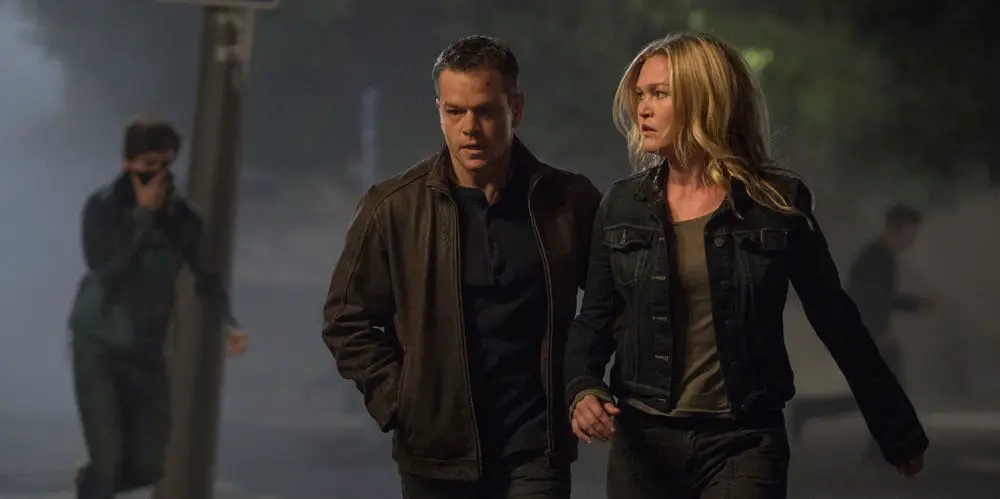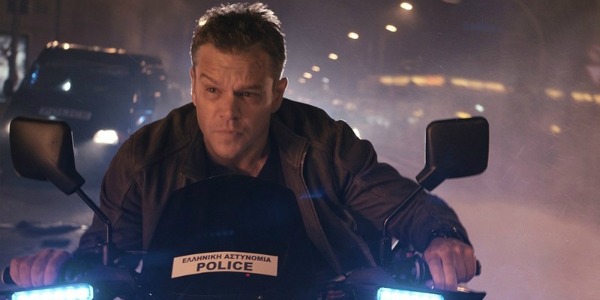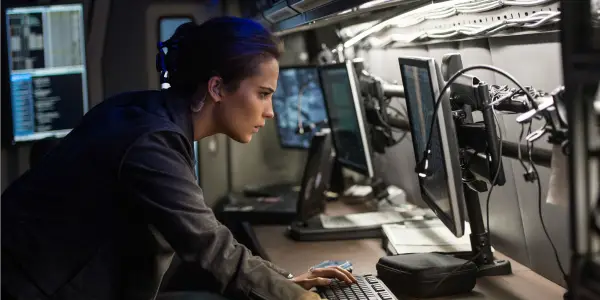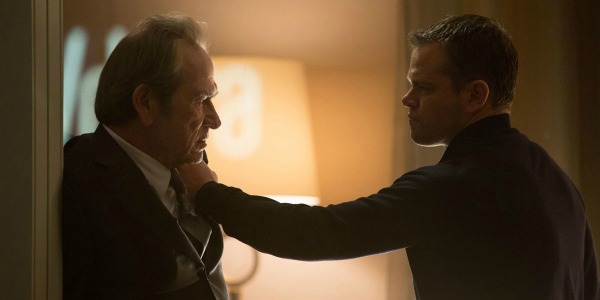JASON BOURNE: A Descent To The Generic

Jay is just a dude who takes in an unhealthy…
Since the inception of the Bourne franchise in 2002, the blockbuster as we know it has undergone a dramatic shift. Variety is limited as superhero films have taken over the industry. There are lingering alternatives like the Mission Impossible and Fast and Furious franchises, but the Bourne films have been the thinking man’s blockbusters since the series began.
There is globetrotting, grand set pieces, and action galore, but the films have been entirely serious in tone. Riddled with technical jargon and political intrigue, the films have managed to blur the line between popcorn flick and spy drama. It has been nine years since the last Paul Greengrass/Matt Damon entry into the series. That shows in Jason Bourne, a film that manages to be very different than any other Bourne film while still sticking to the traditional Bourne formula.
It is the first that would rather choke you with popcorn than tear you apart with great tension. It is a misfire that looks promising early on and devolves into a generic action film that has nothing to say (but wants you to think it does).
Outside of the Universe
The first two Greengrass/Damon Bourne films (Supremacy and Ultimatum) exist in a specifically post-9/11 world. A world that always has one eye open just in case there is a threat lingering somewhere. Jason Bourne has moved beyond that world into a post-Snowden world, where the public is no longer accepting of having their personal information available to the government, no matter what the purpose or the extent.
This conceptual shift is compounded by the fact that this is the first film that writer Tony Gilroy has had no involvement with. Gilroy wrote each of the previous four Bourne films and directed The Bourne Legacy.

Jason Bourne would indicate that Gilroy was the man responsible for the smart espionage side of the series; he is one that allowed the series to transcend the classification of a “traditional blockbuster”. Jason Bourne desperately wants to be that but the film cracks scene by scene into a brainless action film that undermines the title character and construes unbelievable motivations in a world that has always felt believable.
Jason Bourne opens with a brief montage, reminding us what has come before. Essentially, Matt Damon had amnesia, and has come to realize that he was a lethal hitman for a dirty government project. We then find that he has become a backroom brawler in Europe, relishing in the punishment he is handed as much as the violence he delivers.
This is Bourne; this is a man who resents the world that he remembers, but does not find it worthwhile enough to save. At least, this is the Bourne we have come to know up to this point. Now, Greengrass proposes, Jason Bourne is a man who wants to expose the dastardly deeds of the CIA for… some reason?
Perhaps it is Bourne’s daddy issues that this film pulls out of thin air, a superfluous and uninteresting bit of origin story that is a road to nowhere interesting. If Jason Bourne (or, as his birth certificate says, David Webb) only has one memory of his father, should he really be this beat up over his death?
Even worse, Jason Bourne has been transformed into a white knight fighting for the rights of the everyman. He enters into a wild goose chase where we find him less prepared and less knowledgeable than ever before. We have to make far more logical leaps to believe the viability of his plan (or lack thereof) is viable.
A Downward Spiral
The most memorable part of this film is a tremendous set piece early in the film that takes place in Athens, Greece. It is a scene completely in line with the established universe of the Bourne series. Jason Bourne and his old accomplice, Nicky Parsons (Julia Stiles) meet up in the middle of a crowded riot (another attempt to be topical, because Greece).

Large crowds have always been Jason Bourne’s best friend, as assassins can’t kill in front of such large groups of people and it provides an ever-moving cover. Bourne and Parsons perform a ballet through the crowds, complete with melee takedowns and a motorcycle chase. Lurking in the shadows is what the series is about. Events in front of large audiences garner crowds and mass hysteria in the media. This early sequence establishes a grounded reality, but that reality becomes less realistic and less interesting from that point on.
On the hunt for Jason Bourne are CIA Director Robert Dewey (Tommy Lee Jones) and CIA analyst Heather Lee (Alicia Vikander). Vikander is brought in to be the primary foe for Matt Damon’s Bourne, but her motives are extraordinarily convoluted and nonsensical. Any time the usually fantastic Vikander is on-screen there is a sense that the entire film was half-baked from its conception to the final cut.
It is shocking that this is the film that Greengrass and Damon were enthusiastic enough about to return to a series they had both sworn off of. It is as if the series has been moved into a House of Cards world, where the murder of an important political figure is brushed under the rug and never mentioned. It mitigates the importance of death in a series that has seen its fair share of it.
It is one thing to kill an undercover assassin, whose entire existence is kept as tightly wrapped as possible, but the head of the CIA is a completely different story. This is a man who makes public speeches and appears on television. He has a name and a face that people recognize. He is not a disposable asset, he is an important cog in a machine that relies on his cooperation to operate at maximum efficiency. Things like this lead you to believe that the film was not thought all the way through or perhaps rushed.
Bland Finale
Tony Gilroy was an extraordinarily important part of the first three Bourne films (he was an even more important part of The Bourne Legacy, which he directed, but that was a mediocre film that feels separate from the Damon films). If Jason Bourne is any indication, Gilroy was the man responsible for the brains of the films. Greengrass has never been one for dialogue or script specificity. He is a brilliant visual director who can squeeze tension out of any possible situation with very little words spoken.

The problem with this film is that Greengrass was trying to write a Tony Gilroy-esque script about a subject he, apparently, knows little about. The knowledgeable jargon that Gilroy had been known for is replaced in Jason Bourne with buzzwords and abstractions. The most frustrating example of this is a large social media corporation owned by young tech prodigy, Aaron Kalloor (Riz Ahmed), who has been cooperating with the government’s request to send them copious amounts of data that his company collects.
We are repeatedly told how revolutionary Kalloor’s new product is, but we are given absolutely no indication of what it does, only that it has one billion users. This screams, “I know what social media is, but I don’t care enough to nail down the specifics!” This is simply not where Greengrass’ interests lie. He is a minimalist at heart, so completely left to his own devices, you get half-baked ideas like this.
Greengrass’ more successful script, United 93, is far superior because the facts are already there for him to pull from. He can chop off as much as he wants, but all of the specifics are laid out in front of him.
All of the script oversights aside, the overall plot of the film ends in a bombastic truck chase that doesn’t fit in a story with this tone and sensibility. The chase lays waste to the city of Las Vegas, leaving a path of destruction that is usually saved for superhero films or space epics. Espionage and secrecy is completely thrown out the window when cars and casinos are being treated in the same fashion that a young boy treats Hot Wheels and playsets.
And yet, when the chase is over, it is as if it never happened. Everyone goes back to their job and Bourne goes back to being on the run. It is the same as it always has been, but getting there this time was a chore. And that is a shame.
Conclusion
Jason Bourne is an utterly disappointing addition to the Bourne series, lacking any interesting ideas or technical achievement. The script, co-written by Paul Greengrass, is evidence that his interests lie more with style than story specifics. It is a Paul Greengrass original, through and through, and that may be the biggest shortcoming of the film.
Without Tony Gilroy’s involvement, the film becomes less intelligent and less interesting. Greengrass confuses buzzwords for true tech speak and doesn’t really understand what living in a post-Snowden world means. It is the worst film in the series, and that includes The Bourne Legacy.
What did you think of Jason Bourne? Is Paul Greengrass responsible for the new sensibilities of the film?
Jason Bourne was released in the UK on July 27th and in the US on July 29th. For more release info, click here.
Does content like this matter to you?
Become a Member and support film journalism. Unlock access to all of Film Inquiry`s great articles. Join a community of like-minded readers who are passionate about cinema - get access to our private members Network, give back to independent filmmakers, and more.
Jay is just a dude who takes in an unhealthy amount of media of all types. Currently living in Atlanta, Georgia, he firmly believes that all movie theaters should have leather recliners, you eat popcorn too loudly, and if you don't put that cellphone away in 2 seconds you will learn the definition of frontier justice.













